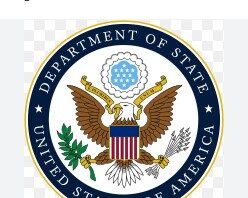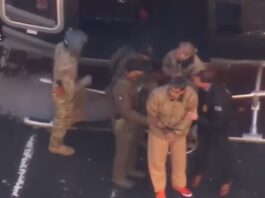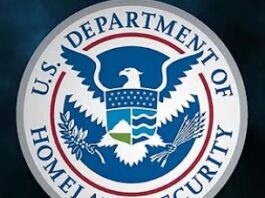Newsman: The U.N. Security Council voted Sunday to hold an emergency special session of the wider membership in the General Assembly this week on Russia’s invasion of Ukraine, after Moscow blocked a draft resolution in the council deploring its aggression.
The measure convening the General Assembly session was adopted by a vote of 11 in favor, with Russia voting against, and China, India and the United Arab Emirates abstaining. the adoption of resolution 377A(V), widely known as ‘Uniting for Peace.’ Following statements by countries in the emergency special session, the General Assembly is expected to vote on a resolution similar to the one taken up Friday by the Security Council. While Assembly resolutions are non-binding, they are considered to carry political weight as they express the will of the wider UN membership.
Around 200 supporters of Ukraine rallied outside the United Nations during the Security Council meeting on Sunday.
“Russia vetoed Friday’s resolution,” U.S. Ambassador Linda Thomas-Greenfield reminded council members. “But as I have said before, Russia cannot veto our voices. Russia cannot veto the Ukrainian people. And Russia cannot veto the U.N. Charter. Russia cannot, and will not, veto accountability.”
Russia also voted against the move to the General Assembly, but as it was a procedural vote, no vetoes were in play. The vote broke down identically to Friday’s failed resolution, with 11 of the 15 Security Council members supporting it and China, India and the UAE abstaining.
“Any attempt to circumvent the position of the Russian Federation, any attempt to disregard it, undermines the very bedrock of the U.N. Charter,” Russian envoy Vassily Nebenzia told the council.
“These are issues that affect all member states, and now, in the General Assembly, they can all make their voices heard on Russia’s war of choice,” Thomas-Greenfield said. “We will then vote on a resolution that will hold Russia to account for its indefensible actions and for its violations of the U.N. Charter.”
She said that a vote on a draft resolution is not likely before at least Wednesday.
On Saturday, amid reports of casualties and people fleeing their homes to seek safety as Russian military operations in the country intensified, the Secretary-General announced that the UN will launch an appeal to fund its humanitarian operations in Ukraine.
A readout issued by a UN spokesperson said that UN chief António Guterres had spoken on the phone with President Volodymyr Zelenskyy and conveyed “the… determination of the United Nations to enhance humanitarian assistance to the people of Ukraine.”
The Secretary-General’s phone call and announcement of a humanitarian appeal followed his earlier decision On Friday to release $20 million from the UN emergency relief fund, known as CERF, to meet urgent needs in Ukraine.
In addition, the Secretary-General announced the appointment of Amin Awad as UN Crisis Coordinator for Ukraine to lead the coordination of all UN efforts, including its humanitarian response, on both sides of the contact line. Later this week in Geneva it is set to launch an appeal for more than $1 billion to cover the next three months.
Now hundreds of thousands of Ukrainians are on the move inside the country seeking safety, as well as crossing into neighboring countries, including Poland, Romania and Moldova.
The council will meet again today, Monday afternoon to discuss the growing humanitarian crisis, France’s ambassador said. The U.N. humanitarian chief and the high commissioner for refugees are both expected to deliver updates. The meeting is under the General Assembly resolution known as “Uniting for Peace.” It allows for special meetings of the entire membership when the U.N. Security Council is deadlocked on an issue and cannot exercise its mandate to maintain or restore international peace and security. In this case, because of Russia’s veto.
“France will, alongside Mexico, submit a draft resolution in order to guarantee unfettered humanitarian access to meet the urgent needs of the people in Ukraine,” Ambassador Nicolas de Riviere said. He told reporters later that it would likely be put to a vote on Tuesday.
“The U.N. General Assembly emergency session is all about condemning an unprovoked war, it is all about upholding the U.N. Charter, it is about sending a clear and iron-strong message of what is acceptable and what is not,” said Albanian U.N. envoy Ferit Hoxha, whose government co-sponsored the resolution with the United States.
Although the council has been divided on many issues, Uniting for Peace has been invoked on less than a dozen occasions since it was adopted in 1950, according to Security Council Report, which tracks U.N. meetings. The last time was 40 years ago concerning Israel.
In addition to going to the General Assembly, Ukraine’s ambassador said his country is also seeking an emergency hearing and order against Russia at the International Court of Justice, alleging that Russia made false claims of genocide in the Luhansk and Donetsk regions of eastern Ukraine to justify its invasion and is now planning genocidal acts elsewhere in Ukraine.
“Russia will have to answer for its behavior at the world court at The Hague,” Sergiy Kyslytsya said.
Switching from English to Russian, the Ukrainian ambassador directly addressed his Russian counterpart, telling Vasily Nebenzya, Ambassador of the Russian Federation that there are always choices in life.


